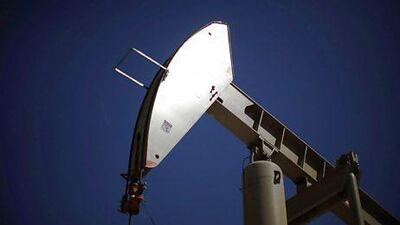American oil prices surpassed US$100 a barrel to their highest level in more than a year as a stock pile-up eased and fears over political uncertainty in Egypt grew.
Yesterday the spread between Nymex West Texas Intermediate and North Sea Brent crude, which has at times traded at a premium of as much as $20 over its American counterpart, narrowed to its lowest since late 2010.
Analysts also pointed to a risk premium stemming from uncertainty over the leadership of Egypt, home to the Suez Canal through which about 2 million barrels of oil pass each day, mostly from the Arabian Gulf. Nymex climbed 1.9 per cent to US$101.52 per barrel, with prices of Brent gaining 1.3 per cent to $105.41 in US morning yesterday.
Robin Mills, of Manaar Energy Consulting, said the effect of Egypt had a bigger part to play in driving Brent's price.
"It's linked to Middle East contagion worries, which are illogical, and concerns of Suez disruption, which is unlikely," he said. He added that the situation in Libya and Iraq were also factors, while Nymex's rise was more linked to US supply issues. After years of disruptions, pipelines and other infrastructure are supplying crude to consumers along the country's east coast, giving refineries a closer source of supplies. In turn, the move is closing the US price gap with global markets.
Oil's rally came on another day of turbulence in Egypt, as the clock ticked down on a 48-hour ultimatum given by the army for the president Mohammed Morsi to end the country's political crisis.
Stocks gave up some gains of the day before as the benchmark EGX 30 index slipped 0.3 per cent to 4,971.06. The index is down 6.8 per cent in the year so far.
"The current situation in Egypt is gloomy and after the short-term rally in stocks investors in wait and see mode," said Ali El Adou, the portfolio manager at The National Investor in Abu Dhabi. "If there's no violence in the transition to power there will be another short-term relief rally but medium-term realism will set in as there will have to be elections and a new constitution."
Banks were told to close their branches three hours early at 2pm by Egypt's central bank, which also brought forward a foreign-currency auction. The move was ahead of the army's deadline.
In global markets, investors fretted about signs of cracks in Portugal's coalition government and disappointing Chinese data.
Ten-year Portuguese government bond yields rose 109 basis points to 7.8 per cent following the resignation of two of Portugal's cabinet members. The departure of the foreign minister, Paulo Portas, and the finance minister, Vitor Gaspar, raised worries that the coalition could collapse and questions about the nation's commitment to austerity measures.
Portugal's president Anibal Cavaco Silva yesterday summoned the main political parties for crisis talks.
The European Commission president José Manuel Barroso, a former premier of Portugal, said the country was in danger of harming its financial stability after two years of sticking to the requirements of its €78 billion (Dh371.5bn) bailout.
"This delicate situation requires a great sense of responsibility from all political forces and leaders," he was quoted by Reuters as saying.
During trading yesterday, the DAX in Germany fell 1.7 per cent to 7,774.43, while the CAC-40 in Paris was down 1.6 per cent to 3,683.70.
Earlier, Japan's Nikkei 225 fell 0.3 per cent to 14,055.56 and Hong Kong's Hang Seng dropped 2.5 per cent to 20,147.31.
China was also fuelling investor concerns. Data released yesterday showed growth in the services sector slumped to its lowest pace in nine months last month. The official purchasing managers' index (PMI) fell to 53.9 from 54.3 the month before. The data followed the release of two separate but equally downbeat PMI surveys earlier in the week.

